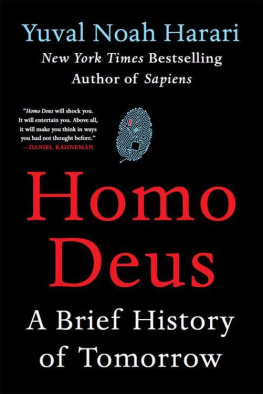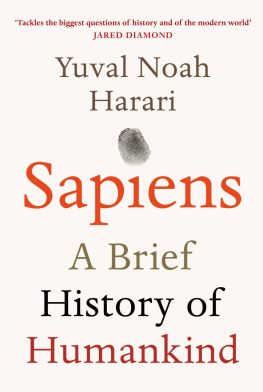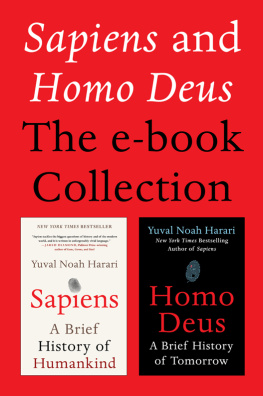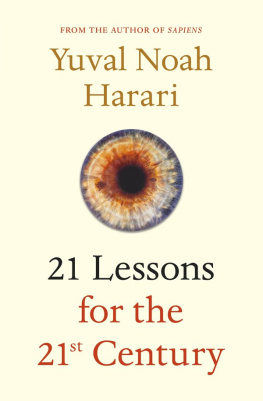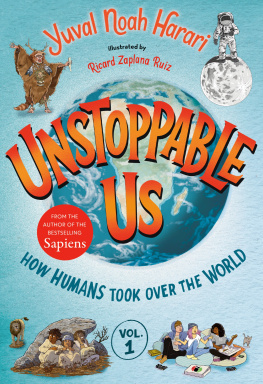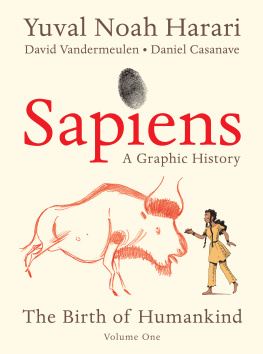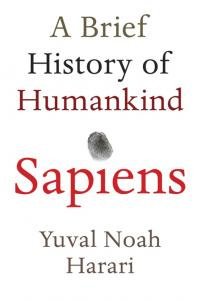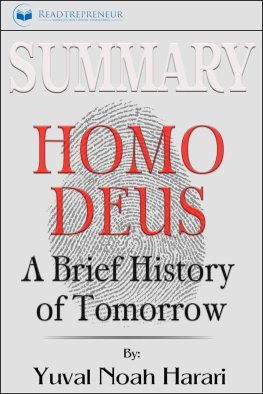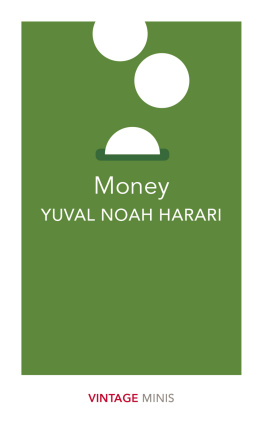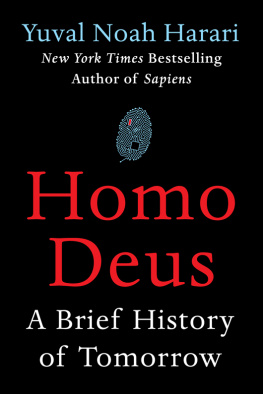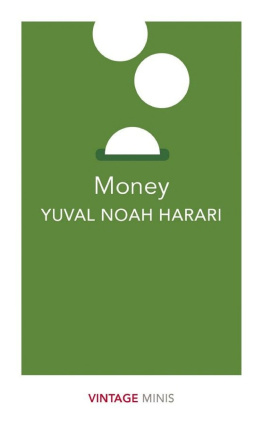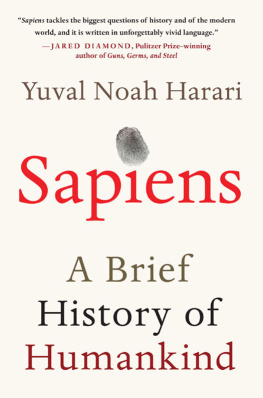Yuval Noah Harari - Homo Deus: A Brief History of Tomorrow
Here you can read online Yuval Noah Harari - Homo Deus: A Brief History of Tomorrow full text of the book (entire story) in english for free. Download pdf and epub, get meaning, cover and reviews about this ebook. year: 2016, publisher: HarperCollins, genre: Politics. Description of the work, (preface) as well as reviews are available. Best literature library LitArk.com created for fans of good reading and offers a wide selection of genres:
Romance novel
Science fiction
Adventure
Detective
Science
History
Home and family
Prose
Art
Politics
Computer
Non-fiction
Religion
Business
Children
Humor
Choose a favorite category and find really read worthwhile books. Enjoy immersion in the world of imagination, feel the emotions of the characters or learn something new for yourself, make an fascinating discovery.
- Book:Homo Deus: A Brief History of Tomorrow
- Author:
- Publisher:HarperCollins
- Genre:
- Year:2016
- Rating:4 / 5
- Favourites:Add to favourites
- Your mark:
- 80
- 1
- 2
- 3
- 4
- 5
Homo Deus: A Brief History of Tomorrow: summary, description and annotation
We offer to read an annotation, description, summary or preface (depends on what the author of the book "Homo Deus: A Brief History of Tomorrow" wrote himself). If you haven't found the necessary information about the book — write in the comments, we will try to find it.
Homo Deus: A Brief History of Tomorrow — read online for free the complete book (whole text) full work
Below is the text of the book, divided by pages. System saving the place of the last page read, allows you to conveniently read the book "Homo Deus: A Brief History of Tomorrow" online for free, without having to search again every time where you left off. Put a bookmark, and you can go to the page where you finished reading at any time.
Font size:
Interval:
Bookmark:

To my teacher, S. N. Goenka (19242013),
who lovingly taught me important things.
Contents

In vitro fertilisation: mastering creation.
Computer artwork KTSDESIGN/Science Photo Library.
At the dawn of the third millennium, humanity wakes up, stretching its limbs and rubbing its eyes. Remnants of some awful nightmare are still drifting across its mind. There was something with barbed wire, and huge mushroom clouds. Oh well, it was just a bad dream. Going to the bathroom, humanity washes its face, examines its wrinkles in the mirror, makes a cup of coffee and opens the diary. Lets see whats on the agenda today.
For thousands of years the answer to this question remained unchanged. The same three problems preoccupied the people of twentieth-century China, of medieval India and of ancient Egypt. Famine, plague and war were always at the top of the list. For generation after generation humans have prayed to every god, angel and saint, and have invented countless tools, institutions and social systems but they continued to die in their millions from starvation, epidemics and violence. Many thinkers and prophets concluded that famine, plague and war must be an integral part of Gods cosmic plan or of our imperfect nature, and nothing short of the end of time would free us from them.
Yet at the dawn of the third millennium, humanity wakes up to an amazing realisation. Most people rarely think about it, but in the last few decades we have managed to rein in famine, plague and war. Of course, these problems have not been completely solved, but they have been transformed from incomprehensible and uncontrollable forces of nature into manageable challenges. We dont need to pray to any god or saint to rescue us from them. We know quite well what needs to be done in order to prevent famine, plague and war and we usually succeed in doing it.
True, there are still notable failures; but when faced with such failures we no longer shrug our shoulders and say, Well, thats the way things work in our imperfect world or Gods will be done. Rather, when famine, plague or war break out of our control, we feel that somebody must have screwed up, we set up a commission of inquiry, and promise ourselves that next time well do better. And it actually works. Such calamities indeed happen less and less often. For the first time in history, more people die today from eating too much than from eating too little; more people die from old age than from infectious diseases; and more people commit suicide than are killed by soldiers, terrorists and criminals combined. In the early twenty-first century, the average human is far more likely to die from bingeing at McDonalds than from drought, Ebola or an al-Qaeda attack.
Hence even though presidents, CEOs and generals still have their daily schedules full of economic crises and military conflicts, on the cosmic scale of history humankind can lift its eyes up and start looking towards new horizons. If we are indeed bringing famine, plague and war under control, what will replace them at the top of the human agenda? Like firefighters in a world without fire, so humankind in the twenty-first century needs to ask itself an unprecedented question: what are we going to do with ourselves? In a healthy, prosperous and harmonious world, what will demand our attention and ingenuity? This question becomes doubly urgent given the immense new powers that biotechnology and information technology are providing us with. What will we do with all that power?
Before answering this question, we need to say a few more words about famine, plague and war. The claim that we are bringing them under control may strike many as outrageous, extremely nave, or perhaps callous. What about the billions of people scraping a living on less than $2 a day? What about the ongoing AIDS crisis in Africa, or the wars raging in Syria and Iraq? To address these concerns, let us take a closer look at the world of the early twenty-first century, before exploring the human agenda for the coming decades.
The Biological Poverty Line
Lets start with famine, which for thousands of years has been humanitys worst enemy. Until recently most humans lived on the very edge of the biological poverty line, below which people succumb to malnutrition and hunger. A small mistake or a bit of bad luck could easily be a death sentence for an entire family or village. If heavy rains destroyed your wheat crop, or robbers carried off your goat herd, you and your loved ones may well have starved to death. Misfortune or stupidity on the collective level resulted in mass famines. When severe drought hit ancient Egypt or medieval India, it was not uncommon that 5 or 10 per cent of the population perished. Provisions became scarce; transport was too slow and expensive to import sufficient food; and governments were far too weak to save the day.
Open any history book and you are likely to come across horrific accounts of famished populations, driven mad by hunger. In April 1694 a French official in the town of Beauvais described the impact of famine and of soaring food prices, saying that his entire district was now filled with an infinite number of poor souls, weak from hunger and wretchedness and dying from want, because, having no work or occupation, they lack the money to buy bread. Seeking to prolong their lives a little and somewhat to appease their hunger, these poor folk eat such unclean things as cats and the flesh of horses flayed and cast onto dung heaps. [Others consume] the blood that flows when cows and oxen are slaughtered, and the offal that cooks throw into the streets. Other poor wretches eat nettles and weeds, or roots and herbs which they boil in water.
Similar scenes took place all over France. Bad weather had ruined the harvests throughout the kingdom in the previous two years, so that by the spring of 1694 the granaries were completely empty. The rich charged exorbitant prices for whatever food they managed to hoard, and the poor died in droves. About 2.8 million French 15 per cent of the population starved to death between 1692 and 1694, while the Sun King, Louis XIV, was dallying with his mistresses in Versailles. The following year, 1695, famine struck Estonia, killing a fifth of the population. In 1696 it was the turn of Finland, where a quarter to a third of people died. Scotland suffered from severe famine between 1695 and 1698, some districts losing up to 20 per cent of their inhabitants.
Most readers probably know how it feels when you miss lunch, when you fast on some religious holiday, or when you live for a few days on vegetable shakes as part of a new wonder diet. But how does it feel when you havent eaten for days on end and you have no clue where to get the next morsel of food? Most people today have never experienced this excruciating torment. Our ancestors, alas, knew it only too well. When they cried to God, Deliver us from famine!, this is what they had in mind.
During the last hundred years, technological, economic and political developments have created an increasingly robust safety net separating humankind from the biological poverty line. Mass famines still strike some areas from time to time, but they are exceptional, and they are almost always caused by human politics rather than by natural catastrophes. In most parts of the planet, even if a person has lost his job and all of his possessions, he is unlikely to die from hunger. Private insurance schemes, government agencies and international NGOs may not rescue him from poverty, but they will provide him with enough daily calories to survive. On the collective level, the global trade network turns droughts and floods into business opportunities, and makes it possible to overcome food shortages quickly and cheaply. Even when wars, earthquakes or tsunamis devastate entire countries, international efforts usually succeed in preventing famine. Though hundreds of millions still go hungry almost every day, in most countries very few people actually starve to death.
Next pageFont size:
Interval:
Bookmark:
Similar books «Homo Deus: A Brief History of Tomorrow»
Look at similar books to Homo Deus: A Brief History of Tomorrow. We have selected literature similar in name and meaning in the hope of providing readers with more options to find new, interesting, not yet read works.
Discussion, reviews of the book Homo Deus: A Brief History of Tomorrow and just readers' own opinions. Leave your comments, write what you think about the work, its meaning or the main characters. Specify what exactly you liked and what you didn't like, and why you think so.

